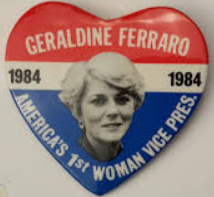Two women have tried doing what Kamala Harris now seeks to do as part of the 2020 Democratic ticket with Joe Biden – win the vice presidency. Their stories deserve review in our consideration of the historical significance of the Harris candidacy. Having examined her selection in the context of the fight for women’s suffrage and early women office holders, we turn now to her predecessors in the quest and the chance she has of becoming MVP -- Madam Vice President.
Geraldine Ferraro
Walter Mondale selected New York Congresswoman Geraldine Ferraro as his run-
Ferraro’s candidacy revealed significant sexism in American politics. First, allegations of financial improprieties in her husband’s real estate business, which she had little involvement with, blunted the initial momentum her selection generated. When reporters first questioned Ferraro about the business, she demonstrated only a modest understanding of the details of a family owned company in which she technically had one-half interest. Though she later handled every question at a late August news conference, the damage had been done.
Vice President George H.W. Bush appeared to patronize Ferraro in their debate, suggesting he could give her some “help” on foreign policy issues. She fought back, saying she didn’t appreciate such insults. Most observers at the time saw the debate as a draw.
Finally, Mondale and Ferraro rarely touched in joint campaign appearances. She said she feared somebody would say, “Oh my, they’re dating.” Presumably the country now has a more mature attitude about women in politics. In 2016, Hillary Clinton won almost three million more popular votes than Donald Trump, the U.S. Senate now includes 26 women, and 101 females hold House seats, including Speaker Nancy Pelosi. Nine women serve as governors. So far, Biden and Harris haven’t been bashful about clasping raised hands in the traditional show of running mate solidarity.
Sarah Palin
Chroniclers of the 2008 presidential election almost uniformly regard Republican John McCain’s selection of Alaska Governor Sarah Palin as his biggest mistake in that campaign.
Palin’s selection represented a sort of Hail Mary pass. McCain trailed Barack Obama badly in the polls and needed something that would jump start his campaign. Picking Palin initially gave the ticket a boost, even a brief lead in a few polls. It didn’t last in light of Palin’s obvious shortcomings. She garnered a cult-like following on the right, but Obama-Biden won the election by nearly ten million votes and took the Electoral College, 375-163.
Kamala Harris: Trailblazer
Even before Biden picked Harris, she’d made her mark on American politics. As we noted in our history of office holding by women, Harris is only the second black woman elected United States Senator, following Carol Mosley Braun, who represented Illinois 1993-99. Harris twice won races for California Attorney General after serving as San Francisco’s district attorney.
In the Senate, Harris established a reputation as a tough, well-prepared interrogator in hearings. Those skills could serve her well in
Republicans have struggled in finding a consistent line of attack against Harris, perhaps demonstrating that they fear her. When Biden announced her selection, Trump latched on to her grilling of Supreme Court nominee Brett Kavanaugh as “nasty” and “mean.” Trump later said electing her would “disgrace” the country, a not-very-thinly-veiled racial slur. Others tried decrying her immigrant heritage, suggesting she isn’t eligible for the vice-presidency. Her father came to the United States from Jamaica and her mother from India, but she was born in Oakland, California, making her as eligible as any other native born U.S. citizen.
History Unfolding
Harris acknowledges she stands on many shoulders, like those of Shirley Chisholm, Bella Abzug, Gloria Steinem, Betty Friedan, and the founders of the
For the moment at least, Harris stands
apart from Ferraro and Palin. The polls say she and Biden have a much better
chance of winning than either of her predecessors.
If they succeed, Harris will honor women like Harriet Tubman, Chisholm, Susan B. Anthony, and Fannie Lou Hamer who blazed trails before her. She will also, for the young women and girls who follow her, shatter another glass ceiling.








No comments:
Post a Comment